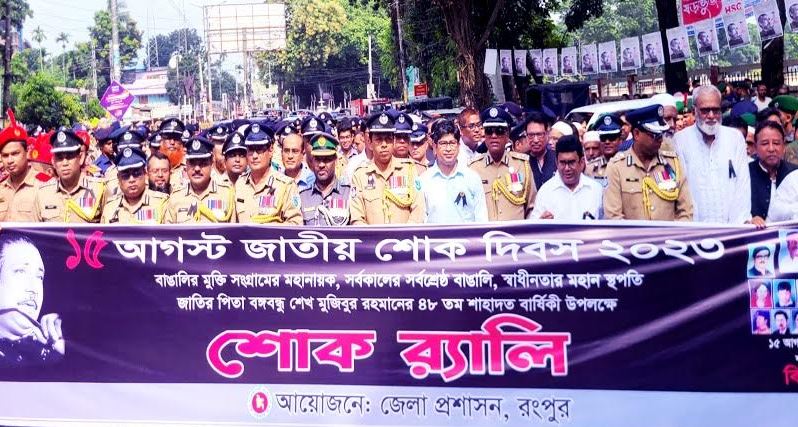
RANGPUR, Aug 15, 2023 (BSS) - The National Mourning Day and 48th martyrdom
anniversary of Father of the Nation Bangabandhu Sheikh Mujibur Rahman was
observed here in a befitting manner with due respect and solemnity today.
The divisional and district administrations, Rangpur City Corporation,
Rangpur Metropolitan Police, Rangpur Range Police, Rapid Action Battalion
(RAB)-13, Awami League, different government departments, educational
institutions, sociocultural and professional and other organisations observed
the day through elaborate programmes.
The observance began with hoisting of the national flag at half-mast atop all
government, semi-government, autonomous, private buildings and educational
institutions after sunrise.
Wearing black badges, officials, political leaders, freedom fighters, heads
of different organizations, institutions and departments and commoners placed
wreaths at the Mural of Father of the Nation Bangabandhu Sheikh Mujibur
Rahman in the morning.
Divisional Commissioner Md Habibur Rahman, Mayor of Rangpur Mostafizar Rahman
Mostafa, Deputy Inspector General of Rangpur Range Police Md Abdul Baten and
Rangpur Metropolitan Police Commissioner Md Moniruzzaman placed there
wreaths.
Deputy Commissioner Mohammad Mobasswer Hasan, Superintendent of Police Md
Ferdous Ali Chowdhury, District Council Chairman and former district unit
Commander of Bangladesh Muktijoddha Sangsad heroic freedom fighter Mosaddek
Hossain Bablu, Conveners and Joint Conveners of Rangpur district and
metropolitan units of Awami League, leaders of its different associate
organisations and political parties also placed wreaths there.
A smart contingent of Rangpur Metropolitan Police gave a guard of honour in
front of the Mural of Bangabandhu in presence of high officials followed by
observance of a one-minute silence paying due respect to Bangabandhu and
offering special munajats there.
Milad mehfils were organised and special munajats offered at all mosques
after the Johr prayers and at mandirs, churches, pagodas and educational
institutions at their convenient times seeking divine blessings for the
departed souls of Bangabandhu and his other family members.
Recitation from the Holy Quran, special discussions on the life and works of
Bangabandhu and milad mehfils were arranged at government shishu paribars.
Marking the Day, Rangpur Kendra of Bangladesh Betar aired special programs
and local newspapers published special supplements on Bangabandhu.
The District Shishu Academy organised competitions on poem recitation,
drawing and ready speech for children focusing on the life, works and
sacrifice of Bangabandhu and true national history.
Documentary films on Bangabandhu on his historic March 7 speech and struggles
for independence and feature films on the War of Liberation were screened at
important places.
Islamic Foundation organised programmes including recitation from the Holy
Qur'an, Hamd, Na'at and Doa mehfil and a discussion on the life and deeds of
Bangabandhu at its auditorium in the city.
Improved diets were served to the inmates of hospitals, jail, shishu
paribars, vagabond centres, orphanages and shelter homes of the elderly
people.
The district administration arranged the main discussion at the District
Shilpakala Academy auditorium followed by prize distribution with the Deputy
Commissioner in the chair.
The divisional and district level high officials, heroic freedom fighters,
leaders of the district and city units of Awami League and noted
personalities participated in the discussion.
The district, city and upazila units of Awami League and its associate
bodies, district unit of Bangladesh Muktijoddha Sangsad and many other
organisations observed the day with elaborate programmes.
The programmes included hoisting of the national flag and party flags at
half-mast at party offices, wearing black badges, placing wreaths at
Bangabandhu's portrait and Mural, mourning processions, recitation from the
Holy Quran, doa mehfils and discussions.
Besides, the district and city units of Awami League distributed foods among
the poor and destitute people at their respective offices and orphanages and
madrasas in the city.